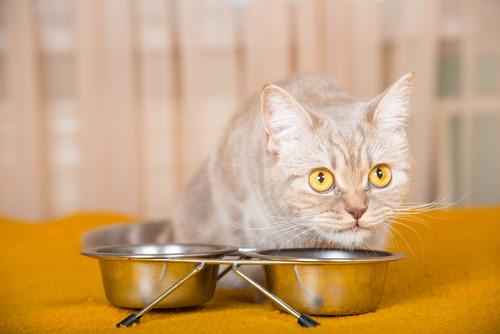
Cat lovers are always trying to think of ways to do the best for their cats. We love to give treats and the best treats are the ones that provide something beneficial (or are at least not harmful to your cat).
Lots of people have canned tuna fish in their pantries and because of the distinctive scent, our cats seem to notice when we open a can. It makes us feel good to make our cats happy and tuna (and its juice) sure seem to make cats happy. Of course it is normal to want to share with your friend. But is it a good idea?
Canned tuna fish is tasty, convenient, and affordable. But there are things you should consider before you share canned tuna fish with your cat.
What are the ingredients?
Make sure tuna that you are going to share is 100% real fish, packed in water. Artificial fish flavors have been implicated in contributing to hyperthyroidism in cats. Artificial flavors are seldom a good idea for anyone and they can lurk in places you would never expect. Excessive oil and salt in packaging may not be in the best interest of your cat either.
Who is your cat really and what is a natural food to him?
Think about what your cat would be eating if he lived like his ancestors. Tuna is a deep water ocean fish, so it is not a natural food source for small felines, who would be more likely to eat small, land prey or small, shallow water fish. His body is not prepared to deal with the presence of compounds, like mercury that can come from the deep sea. Tuna fish has been discussed as a health risk for humans because of the possibility of mercury. There have been daily and weekly limits proposed for humans, especially pregnant women.1

How is the tuna packaged and processed?
Certain compound found in the lining of cans have been implicated in causing health problems for cats and humans alike. Bisphenol-a (BPA) has been a source of concern worldwide. More research should be done to determine the exact risk of BPA, but it has been identified as causing various health effects including thyroid dysfunction and some people believe it is a contributor to the world wide increase in hyperthyroidism in cats. 2
One study found that cats fed exclusively tuna diets had alterations in behavior and did not seem to flourish. 3 As in most things, the answer lies in balance. There is not a clear and present danger in offering your cat tuna juice, but you should exercise common sense and moderation. A little tuna juice when you are already cooking with it is unlikely to cause problems, but it should only be used in small amounts as a treat. Don’t worry, your cat does not have a way to measure if you shared a little or a lot and she will just be grateful that she got something that smells so good to her!
Join in the FUR-vor by finding me on Facebook by clicking here!
Want to know cool things about dogs too? Check out my features on www.iheartdogs.com too.
- Hair mercury concentrations in cats and dogs in central Japan, Br Vet J. 1995 Mar-Apr;151(2):215-9.Sakai T, Ito M, Aoki H, Aimi K, Nitaya R.
- A critical review of food-associated factors proposed in the etiology of feline hyperthyroidism. Journal of Feline Medicine and Surgery October 2015 17: 837–847, first published on November 3, 2014 doi:1177/1098612X14556558
- A tuna fish diet influences cat behavior. J Toxicol Environ Health. 1988;24(2):161-72.Houpt KA, Essick LA, Shaw EB, Alo DK, Gilmartin JE, Gutenmann WH, Littman CB, Lisk DJ.
